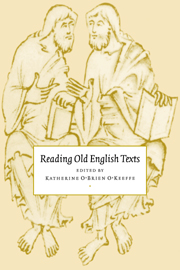Book contents
- Frontmatter
- Contents
- List of contributors
- List of abbreviations
- Note on the text
- Introduction
- 1 The comparative approach
- 2 Source study
- 3 Language matters
- 4 Historicist approaches
- 5 Oral tradition
- 6 The recovery of texts
- 7 At a crossroads: Old English and feminist criticism
- 8 Post-structuralist theories: the subject and the text
- 9 Old English and computing: a guided tour
- Suggestions for further reading
- Index
8 - Post-structuralist theories: the subject and the text
Published online by Cambridge University Press: 18 December 2009
- Frontmatter
- Contents
- List of contributors
- List of abbreviations
- Note on the text
- Introduction
- 1 The comparative approach
- 2 Source study
- 3 Language matters
- 4 Historicist approaches
- 5 Oral tradition
- 6 The recovery of texts
- 7 At a crossroads: Old English and feminist criticism
- 8 Post-structuralist theories: the subject and the text
- 9 Old English and computing: a guided tour
- Suggestions for further reading
- Index
Summary
Jacques Derrida identifies in the history of western philosophy a point of rupture, at the time of Freud, Nietzsche, Heidegger, and Saussure, ‘when the structurality of structure had to begin to be thought’. At this point, structuralism began. Derrida himself, Jacques Lacan, Roland Barthes, Julia Kristeva, and Michel Foucault marked another rupture in the late 1960s and early 1970s with the publication of their groundbreaking work, which formed an intellectual core for the sexual, social, and political revolutions of the time. At that point, post-structuralism began. Since then this theoretical perspective has been largely resisted by Anglo-Saxonists, perhaps because its theoretical diction and syntax have seemed to obscure matters that had seemed clear enough before post-structuralist interventions, and perhaps because the theories have seemed to be more concerned with their own post-modernist era than with the Middle Ages. Though certain strains of post-structuralism have been criticized as ahistorical (and some of the theories can be practiced that way), post-structuralist theories can provoke new historical analyses and can provide questions and methodologies that shed new light on Old English texts and Anglo-Saxon cultures, in part because their interventions do disturb the seeming clarity with which medieval texts have represented their world to modern scholars. More than anything else, post-structuralist theories help us look at the texts not as direct representations of culture but as participants in the construction of meaning for Anglo-Saxon culture and society, and thereby in the construction of the culture and society themselves.
- Type
- Chapter
- Information
- Reading Old English Texts , pp. 170 - 191Publisher: Cambridge University PressPrint publication year: 1997
- 5
- Cited by



